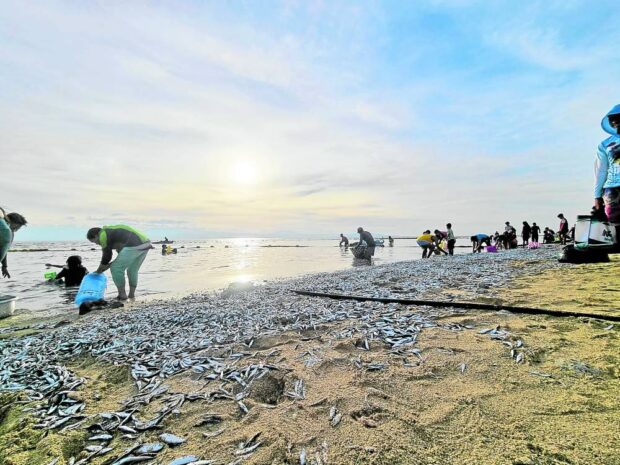Deluge of sardines delights, worries Sarangani folk

BEACHED | Thousands of sardines covered kilometers of shoreline in Maasim, Sarangani province, in this photo taken on Jan. 7, 2023. (Photo courtesy of CIRILO LAGNASON JR. / Contributor)
KORONADAL CITY, South Cotabato, Philippines — Residents of a coastal village in Maasim town of Sarangani province described the deluge of sardines along some 2- to 4-kilometer stretch of shoreline in the area a “blessing from above” that must be shared with everyone.
But some villagers, who noted how the photos and videos of the sardine deluge became viral on social media, were worried what the phenomenon could mean, wondering if it was an omen of bad things to come.
Mark Baya, a resident of Maasim, feared that a new calamity was upcoming and that the beaching of the sardines could be an “advance notice.”
“My fear may be baseless but who knows?” he asked in a social media post.
But for Cirilo Lagnason Jr., development management officer III of the Department of Environment and Natural Resources in the Soccsksargen region, “what is better than a morning with the bountiful school of fish flooding the shoreline?”
Article continues after this advertisementHe said the deluge of sardines only showed the bounty of Sarangani Bay.
Article continues after this advertisementUpwelling
He called the phenomenon as “upwelling” or the process when colder water was pushed toward the ocean surface, bringing nutrients, including plankton—the diet of these juvenile fishes.
As a result, bulks of fishes are trapped in shallower areas, making them easier to catch, thus sending them to the coast of Barangay Tinoto in Maasim.
Lagnason, also a science research specialist, said the phenomenon was common in some areas of the Philippines, including the Zamboanga and Masbate provinces and Dipolog City.
“The beaching of juvenile pelagic sardines is not necessarily a sign of underwater seismic activity,” Lagnason, also an Asean youth biodiversity leader at the Global Youth Biodiversity Network, said in his social media post.
“These fish may still be edible as long as they are consumed immediately or preserved,” he added.
Sardines are young pilchards or other young or small herring-like fish, the kind that inhabits the water column in nearshore and offshore areas. In the Philippines, the sardines live in coastal waters over the continental shelf with a depth of less than 200 meters.
In October 2021, a huge number of medium-sized yellow fin tuna were also beached along the coast of Barangay Nalkan, Datu Blah Sinsuat, Maguindanao del Norte province.